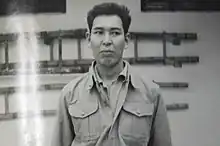Kanao Inouye
Kanao Inouye (May 24, 1916 – August 27, 1947)[1] was a Canadian citizen of Japanese descent, convicted of high treason and war crimes for his actions during World War II. Known as the "Kamloops Kid", he served as an interpreter and prison camp guard for the Imperial Japanese Army and the Kenpeitai political police.
Kanao Inouye | |
|---|---|
 Inouye in British custody (1945) | |
| Born | 24 May 1916 |
| Died | 27 August 1947 (aged 31) |
| Cause of death | Execution by hanging |
| Criminal status | Executed |
| Conviction(s) | High treason |
| Criminal penalty | Death |
Early life in Canada
A Nisei (second-generation Japanese-Canadian), Kanao Inouye was born to immigrant parents in Kamloops, British Columbia. His father, Tadashi Inouye, had emigrated to British Columbia from Tokyo, and had been a decorated Canadian soldier during World War I.[2] Although his father died in 1926, Inouye at his first trial described his life in Canada as happy. His family nevertheless maintained close ties to Japan, where his grandfather, Chotahara Inouye, was a Member of Parliament in the House of Peers.[2] After he graduated from Vancouver Technical School, Inouye's family urged him to go to Japan to continue his education. He did so in 1938 and was still there when World War II began.[2][3]
War years
In 1942, Inouye was conscripted into the Imperial Japanese Army as an interpreter. Made a sergeant, he was assigned to Sham Shui Po prison camp in Hong Kong, which housed Canadian prisoners of war from the Hong Kong Garrison. Inouye was noted for his unusual brutality. He beat prisoners at random, stating it was in retaliation for racism and discrimination that he had received in Canada. In contrast to his later trial testimony about his childhood, he allegedly told them: "When I was in Canada I took all kinds of abuse. ... They called me a 'little yellow bastard'. Now where is your so-called superiority, you dirty scum?"[4][5]
Inouye was discharged from the army the following year, but in 1944 he was conscripted as an interpreter for the notorious Kenpeitai military police in Hong Kong. Trial testimony stated he had been an enthusiastic torturer of suspected spies and traitors. Former POWs said that Inouye was responsible for the torture of multiple Canadian POWs and other civilians.[2][5][6][7]
Conviction and execution
After the Japanese capitulation in August 1945, Inouye was arrested in Kowloon and tried for war crimes by a British military court. In 1946, he was found guilty of torturing prisoners of war and civilians. Inouye had been accused of murdering four detainees, but was acquitted of those charges. Under normal circumstances, the lesser verdict would have spared his life, since British war crimes courts did not condemn anyone to death if none of their victims had died. However, Inouye was sentenced to death on the grounds that his Canadian citizenship constituted a serious aggravating factor.[8]
The verdict was overturned on appeal, since as a Canadian citizen, Inouye could not be prosecuted for war crimes committed by an enemy army.[8] In April 1947, Inouye was tried for high treason. He was found guilty and sentenced to death. On August 27, 1947, Inouye was executed by hanging on the gallows at Hong Kong's Stanley Prison. His last word was "Banzai!"[9]
Citations
- "Inouye Kanao Faces Trial: Arguments Over Nationality (Hong Kong Trials)Canada ALPHA 加拿大史維會". www.alpha-canada.org. Retrieved 24 August 2022.
- Brode P, "Canada's war criminal Kanao Inouye", Esprit de Corps, December 2002.
- Granatstein J, "The Last Good War: An Illustrated History of Canada in the Second World War 1939–1945" 2005: Douglas and McIntyre. p. 60.
- Greenhous B, "'C' Force to Hong Kong: A Canadian Catastrophe 1941–1945" 1997: Dundurn Press. p. 130.
- Woo T, "Responsibility Archived 2011-07-24 at the Wayback Machine" The Fighting 44s: Uniting the Asian Conscience, April 17, 2006.
- Souza, Michael. "The Life of a Veteran: Biography of Henry Anthony Souza". www.macaneselibrary.org. Retrieved 24 August 2022.
- "Hong Kong's War Crimes Trials Collection". hkwctc.lib.hku.hk. Retrieved 24 August 2022.
- "Hong Kong's War Crimes Trials Collection". hkwctc.lib.hku.hk. Retrieved 13 November 2022.
- Roland CG, "Long Night's Journey Into Day: Prisoners of War in Hong Kong and Japan 1941 - 1945" 2001: Wilfrid Laurier University Press. p. 315–316.